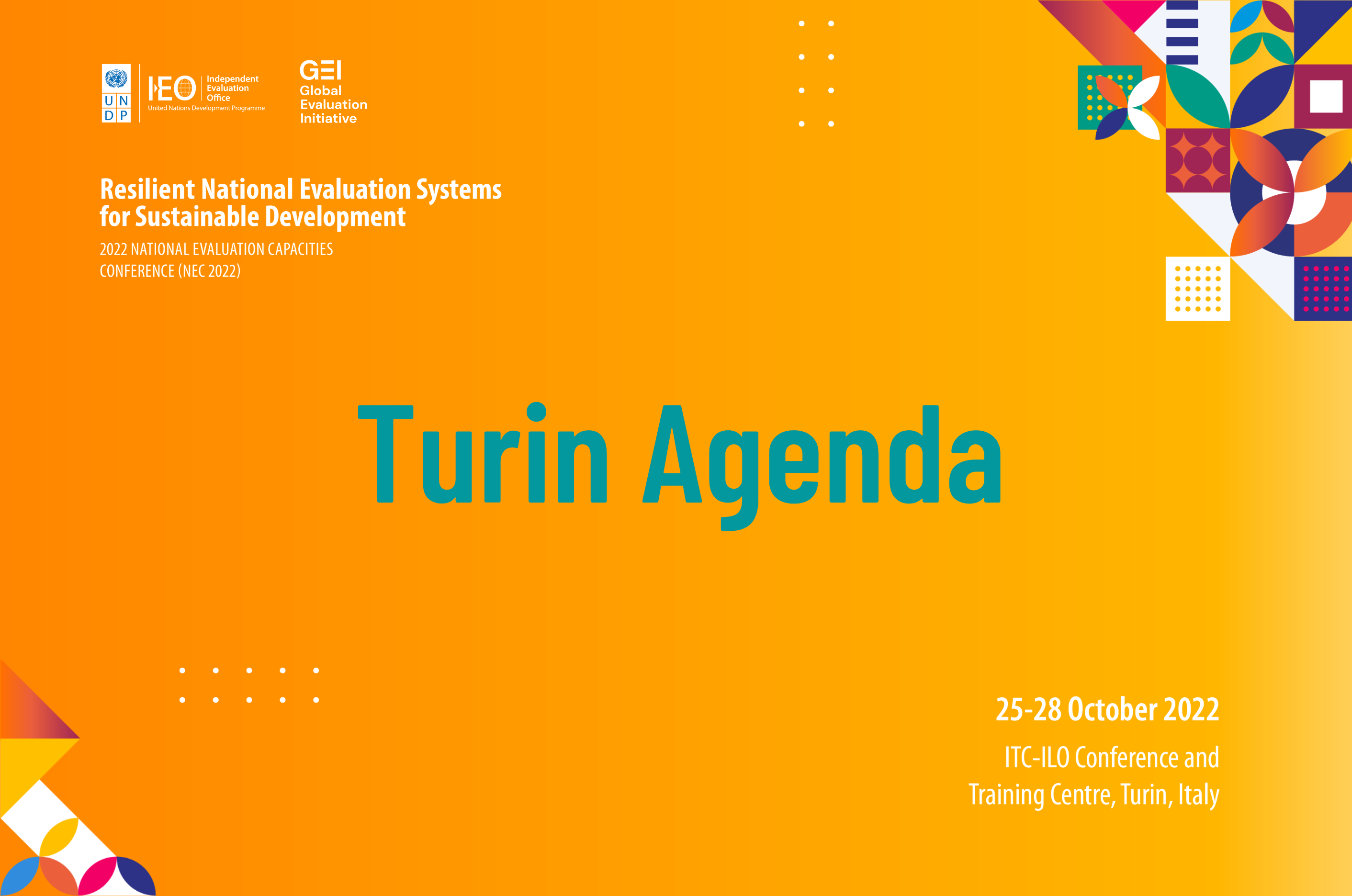
INTRODUCTION
Over 300 participants from more than 100 countries, representing national governments, bilateral and multilateral agencies, international development and humanitarian agencies, civil society and the international evaluation community gathered in Turin from 25 to 28 October 2022 to discuss the development of resilient national evaluation systems that inform policy and other decision making in a rapidly changing world.
This Agenda builds on the learning and experiences that were shared and discussed during the Turin conference. It serves as a common framework for action and collective commitment to rapidly and sustainably strengthen national evaluation.
TURIN AGENDA
We, the participants in the 2022 National Evaluation Capacities Conference (Turin Italy, October 25-28), collectively agree on the following.
We note that since the onset of the COVID-19 pandemic:
- At the midway point of the 2030 Agenda, progress towards the SDGs has slowed and reversed in many countries and regions of the world.
- The COVID-19 pandemic has led to a global health and economic crisis impacting the ability of many countries to respond to crises.
- The health crisis has been compounded by rising geopolitical tensions, which are exposing the fragility of global systems and sustainable development pathways, as well as their vulnerability to disruption.
- Inequality has intensified, with profound and deepening disparities in access to resources and opportunities for different groups of people.
- Multiple crises have further intensified gender inequality with a regressive social and economic impact on women and girls.
- The negative impacts of climate change are accelerating and disproportionately affecting vulnerable nations and populations least able to cope.
- Overlapping crises are challenging the very tenets of existing development paradigms, and we must re-envision our conceptual frameworks and push for greater innovation, creativity and adaptation in evaluation systems and practices.
- Development data and statistics fundamental to monitoring SDG progress as well as policy evaluations are evolving but not at the pace required.
- The opportunities and possibilities offered through digital transformation show great promise, even as access to the internet remains beyond the reach of a third of the world’s population and risks of deepening social inequalities, disinformation and polarization continue.
We further note that:
- We are rapidly approaching the time when decisions will be made about the transition beyond the Sustainable Development Goals. To support this turning point in the international development agenda, evaluation must play a greater role in providing decision makers with the evidence that they need to make decisions for the world today and beyond 2030.
We recognise that as a result, national evaluation systems need to:
- Be led by national governments, respecting the principle of national ownership over the development process and ensure their sustainability through national resource allocation.
- Urgently develop capacities to provide timely, credible and robust evidence to policymakers and policy implementation processes, to support efforts to build forward better.
- Be ever more agile and flexible to rapidly meet shifting and urgent needs for evidence to guide policies and practices.
- Actively seek to connect with evidence generated by relevant - and not just traditional - research and statistical disciplines, as well as administrative data and monitoring processes and systems.
- Ensure linkages across sectors, spheres of government and geographical locations in more comprehensive national evaluation systems.
- Be led by contextual specificities in all aspects of evaluation planning, processes and practices.
- Consider fragility and resilience in all aspects of evaluation planning and implementation, including how evaluation can contribute to peace building and rehabilitation, taking proper account of the context, relevant risks and threats.
- Prioritise inclusiveness and leaving no-one behind, and efforts to address intersecting inequalities.
- Actively give voice to people from all walks of life, paying special attention to youth, women and girls, and those who are often excluded and marginalised.
- Meaningfully mainstream environmental sustainability and climate considerations when evaluating policies, programmes or portfolios of work, to foster the consistent integration of mitigation and adaptation efforts into system design and implementation.
- Prioritise access to, and the adoption of, inclusive digital strategies and solutions, especially those that also reduce the environmental impacts of evaluation.
Therefore, recognizing these imperatives and the complex contexts within which we work, we will strive to:
- Ensure that our work improves people’s lives building more resilient societies, to support the achievement of the 2030 Agenda and the SDGs.
- Create inclusive and transparent systems that actively engage with stakeholders, including government partners, parliamentarians, the private sector, citizens and civil society, and incorporate their diverse and informed viewpoints and expertise to generate credible evidence to support policies and programmes that leave no-one behind.
- Ensure national and subnational evaluation systems respond to distinct national and local contexts and are aligned with national development programmes and strategies.
- Ensure national and subnational evaluation systems are adequately and realistically funded and financed.
- Ensure evaluation systems take into account the potential, current and projected impact of all policies and programmes on climate and ecosystems in order to help avoid, mitigate and address these existential crises affecting our planet and human development.
- Support adaptive systems that can provide rapid information to aid in crisis responses without compromising ethics.
- Emphasise gender equality and social inclusiveness in evaluations and evaluation systems.
- Rapidly develop and support the analysis and mapping of evaluation systems, as well as contextually relevant and culturally appropriate capacity development strategies and metrics to measure their development.
- Develop targeted digital strategies that facilitate innovations in data and evidence collection and analysis and their ethical use.
- Create ample space for young and emerging evaluators to lead and participate in shaping and strengthening national evaluation systems and future development pathways.
- Strengthen partnerships and redouble our efforts to accelerate the development of resilient, agile, flexible, adaptable and forward-looking national evaluation and statistical systems that are utility-focused, integrated into decision-making processes, and help ensure better evidence is generated to support policies that improve peoples’ lives.